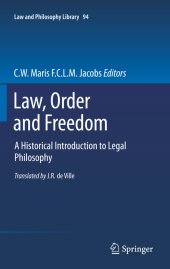 Neuerscheinungen 2012Stand: 2020-01-07 |
Schnellsuche
ISBN/Stichwort/Autor
|
Herderstraße 10
10625 Berlin
Tel.: 030 315 714 16
Fax 030 315 714 14
info@buchspektrum.de |

J. R. De Ville, F.C.L.M. Jacobs, C. W. Maris
(Beteiligte)
Law, Order and Freedom
A Historical Introduction to Legal Philosophy
Übersetzung: de Ville, J.R.; Herausgegeben von Maris, C.W.; Jacobs, F.C.L.M.
2012. xiii, 388 S. XIII, 388 p. 235 mm
Verlag/Jahr: SPRINGER NETHERLANDS; SPRINGER, BERLIN 2012
ISBN: 9400755694 (9400755694)
Neue ISBN: 978-9400755697 (9789400755697)
Preis und Lieferzeit: Bitte klicken
This book offers a historical overview on questions of individual autonomy and fundamental freedoms in a pluralistic society, and the extent to which modern Enlightenment values can serve as the universal foundation of law and society.
The central question in legal philosophy is the relationship between law and morality. The legal systems of many countries around the world have been influenced by the principles of the Enlightenment: freedom, equality and fraternity. The position is similar in relation to the accompanying state ideal of the democratic constitutional state as well as the notion of a welfare state. The foundation of these principles lies in the ideal of individual autonomy. The law must in this view guarantee a social order which secures the equal freedom of all. This freedom is moreover fundamental because in modern pluralistic societies a great diversity of views exist concerning the appropriate way of life. This freedom ideal is however also strongly contested. In Law, Order and Freedom, a historical overview is given pertaining to the question of the extent to which the modern Enlightenment values can serve as the universal foundation of law and society. Law, Order and Freedom gives an account of the history of Western legal and political philosophy, starting with the pre-Socratics and ending with Rawls. It examines in detail the development of the Enlightenment values of freedom and equality, the foremost principles of many present-day constitutions. The underlying ideal of individual autonomy, characteristic of modern times, has nevertheless been contested throughout its history. Against the background of this historical development, Law, Order and Freedom enquires further whether the modern Enlightenment values can serve as a foundation for law and society in the modern era where a great diversity of worldviews exists.
Law, Order and Freedom will be an invaluable resource for those with an interest in legal and political philosophy.
Chapter 1 Legal Philosophy: The Most Important Controversies; Maris.- Chapter 2 Antiquity and the Middle Ages; Van der Vliet (2.1-2.4, with contributions by Maris), Jacobs (2.5-2.8, with contributions by Van der Vliet).- Chapter 3 The Commencement of the Modern Age; Den Hartogh, with an introduction by Maris.- Chapter 4 Hobbes, Locke and Spinoza; Den Hartogh (4.1, 4.2, 4.4), Jacobs (4.3).- Chapter 5 Eighteenth-Century French Enlightenment; Kaptein (5.1-5.7; 5.6 partly by Maris).- Chapter 6 The Synthesis of Kant; Maris (6.1, 6.2, 6.5), Jacobs (6.3, 6.4.3, 6.6), Van der Vliet (6.4.1, 6.4.2).- Chapter 7 Nineteenth Century; Maris (7.1, 7.4.1-7.4.5, 7.4.7, 7.5), Jacobs (7.2, 7.4.6), Van Erp (7.3).- Chapter 8 Twentieth Century; 1900-1945: Maris (8.1, 8.3-8.5), De Ville (8.2).- Chapter 9 Twentieth Century; 1945-2000; Maris (9.1-9.4), De Ville (9.5).- Chapter 10 Conclusion: Law, Order and Freedom; Jacobs (10.1-10.5, 10.9-10.10, with contributions by Maris), Maris (10.6-10.8).- Bibliography.- Index of Names.


